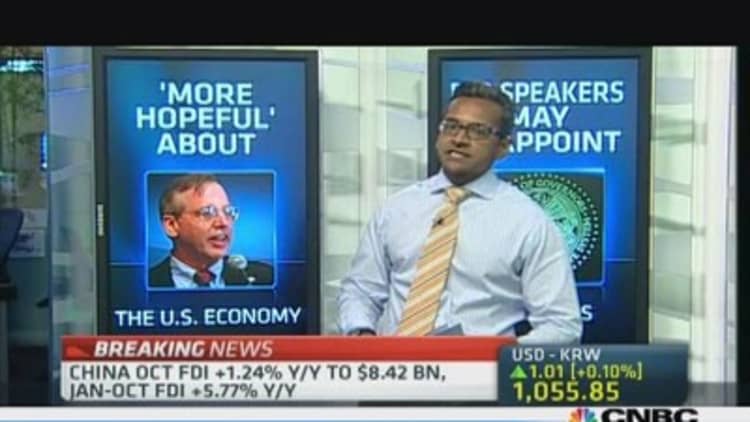
Foreign investors dumped short-dated U.S. assets in September amid jitters about the possibility of a debt default, but snapped up longer-dated assets, the latest data from the U.S. Treasury show.
Foreign investors sold a net $106.8 billion worth of U.S. assets including short-dated assets such as bills in September, marking the biggest decline since February 2009, Treasury International Capital (TIC) data released late on Monday showed.
(Read more: Market milestones feed fear of bubbles)
But the data also showed that net foreign purchases of long-term securities were $25.5 billion in September. Holdings of longer-dated Treasurys rose by $27.8 billion, following a decline of $10.8 billion the month before.
In September, jitters about political wrangling in Washington over the federal budget and debt ceiling grew, with a partial-shutdown of the government in October fueling fears of a possible debt default in the world's biggest economy.
Those jitters led to a spike in yields on short-dated bills, viewed as the most vulnerable to any problems the U.S. government may face in meeting its debt obligations. The U.S. Congress raised the debt ceiling a day before the Treasury said it would run out of cash to meet some of its obligations.
"There were some technical reasons why people didn't want to own the short-end [of the government bond yield curve]. If the U.S. defaults, it's likely that is the area that would be affected," said Bank of Singapore Chief Economist Richard Jerram.
Analysts say the data shows that while the political deadlock sparked selling of short-dated bills, it did not have a significant impact on how foreign investors view long-term U.S. investments.
"Investors wanted to get rid of the immediate risks associated with a possible short-term paralysis in the U.S. cash-flow mechanism, but the underlying fundamentals facing U.S. securities were not broken," said Vishnu Varathan, market economist, Mizuho Corp Bank.
"There is still no credible alternative to the depth and liquidity of the U.S. debt markets," he added.
(Read more: Jack Lew is leading world in economic recovery)
Last month's political crisis in Washington triggered a debate about whether foreign investors would diversify away from U.S. assets and in particular Treasurys, which are held in central bank reserves around the world.
U.S. Treasury Secretary Jack Lew, in Asia last week for a five-nation trip, told CNBC that the crisis had been a political and not economic one.
Indeed, China and Japan, the two biggest foreign holders of foreign debt, both voiced their concern at the time about the implications of possible U.S. debt default.
(Read more: US crisis over, will China re-think Treasury holdings?)
The TIC data showed that China, the biggest foreign holder of U.S. bonds, raised its holdings of Treasurys to $1.294 trillion in September, the highest level in four months. Japan also increased its Treasury holdings that month.
"People were skirting around the immediate self-made crisis in September and October rather than really questioning the status U.S. Treasurys," said Varathan.
—By CNBC.Com's Dhara Ranasinghe; Follow her on Twitter @DharaCNBC


